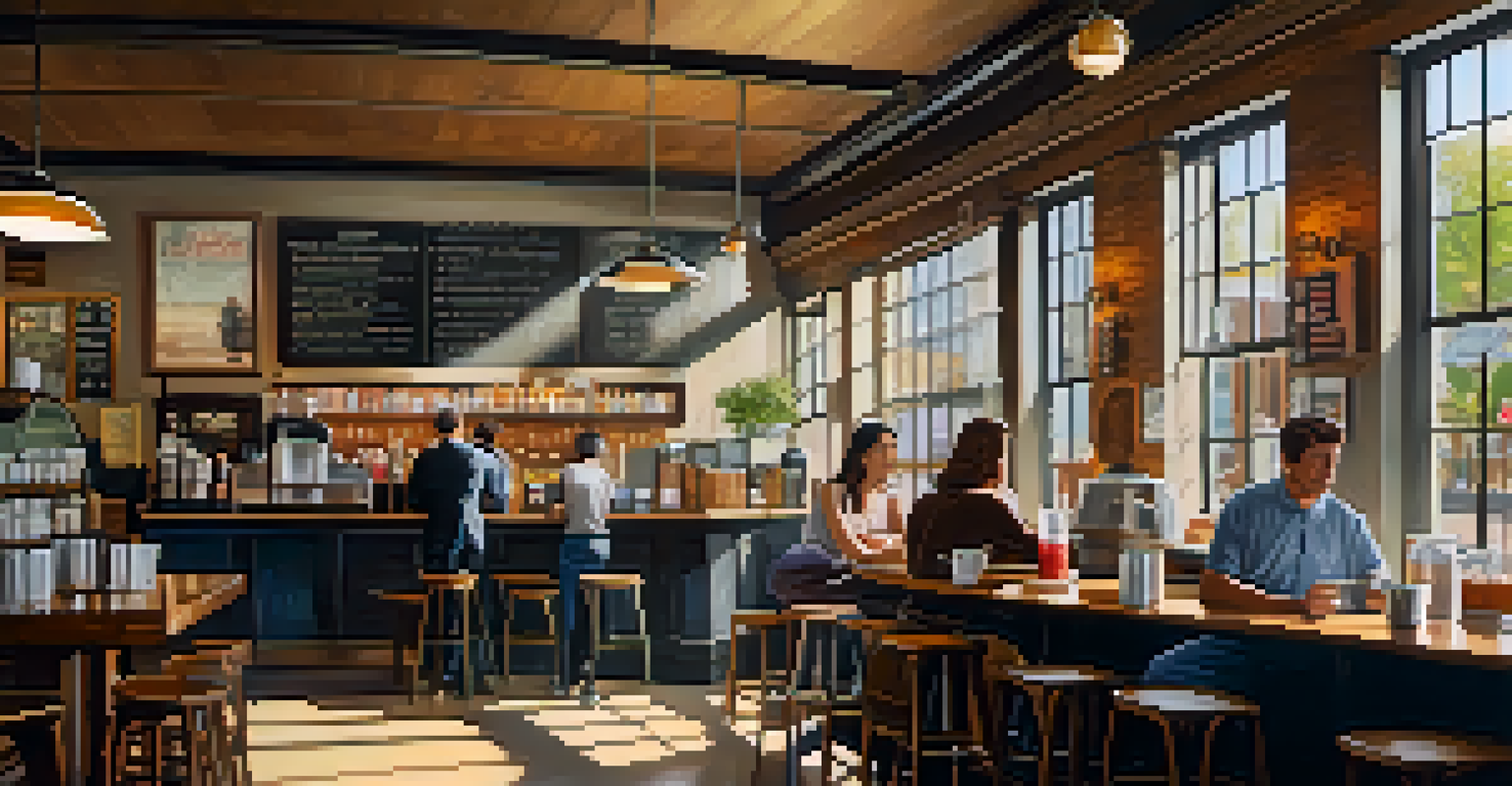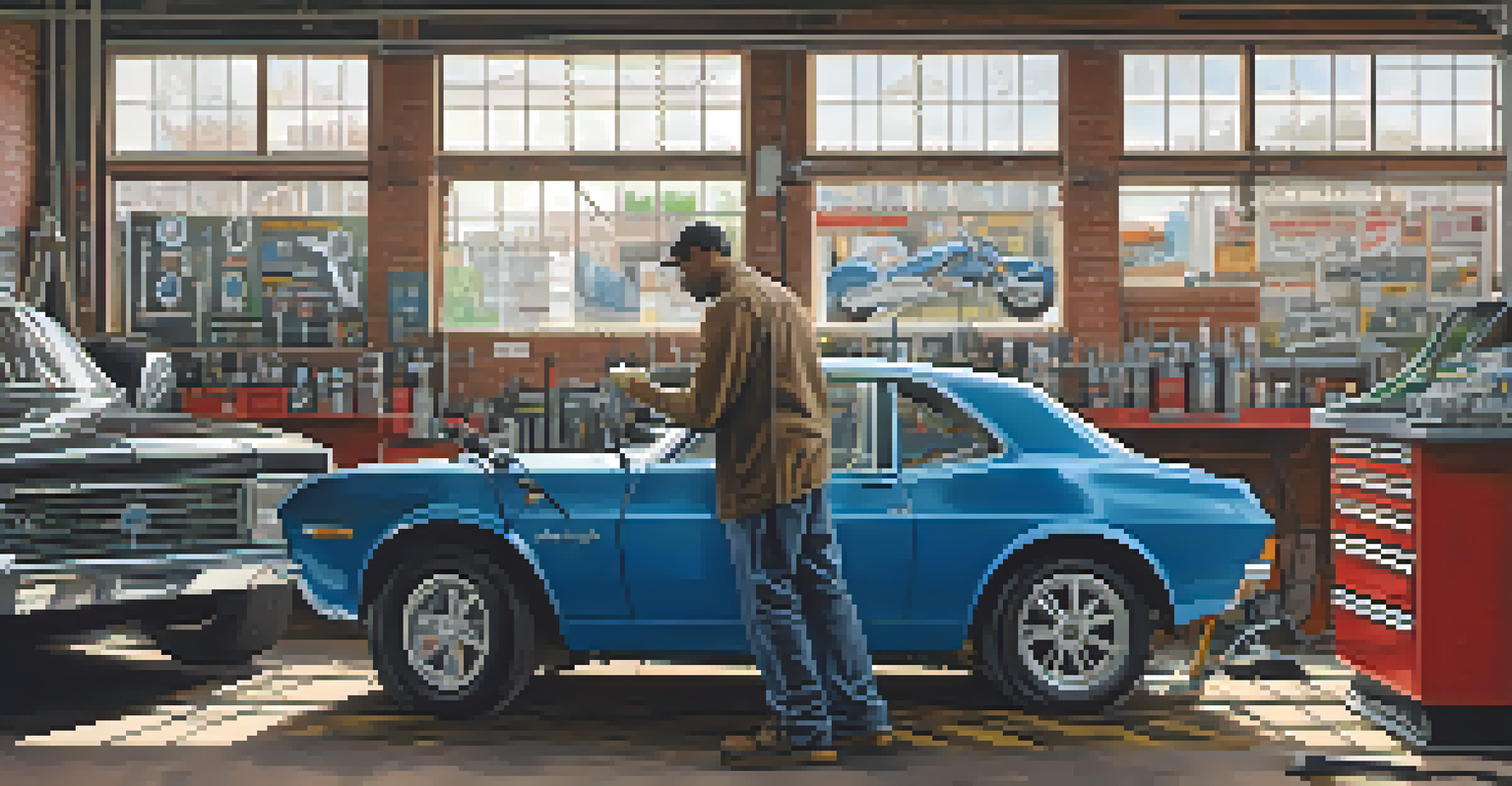Impact of the Auto Industry on Detroit's Small Businesses

Historical Roots: Detroit's Auto Industry Legacy
Detroit has long been known as the Motor City, a moniker earned through its rich automotive history. The auto industry established a robust economic foundation, drawing countless workers and entrepreneurs to the region. This influx not only created jobs but also fostered a vibrant small business community, as workers sought services and goods nearby.
Innovation distinguishes between a leader and a follower.
From local diners to auto parts shops, small businesses thrived alongside major automotive manufacturers. These establishments became essential to the daily lives of auto workers and their families, creating a symbiotic relationship that fueled the local economy. Moreover, the industry's growth encouraged innovation and entrepreneurship, laying the groundwork for future generations.
However, this reliance on the auto industry also made Detroit vulnerable to economic shifts. As global markets changed, the impact of downturns in the automotive sector rippled through the small business landscape, showcasing both the strength and fragility of this interconnected relationship.
Economic Impact: Jobs and Revenue Generation
The auto industry has been a primary driver of economic activity in Detroit, generating millions in revenue and creating thousands of jobs. This economic engine supports not only the large manufacturers but also the myriad of small businesses that serve their workforce. For instance, small cafes and restaurants see a steady stream of customers during lunch breaks, benefiting from the nearby factories.

Furthermore, the presence of major automotive companies fosters a business ecosystem where suppliers and service providers can thrive. Local businesses often find opportunities to collaborate with these larger entities, whether through providing parts or offering essential services. This creates a network of interdependence that bolsters the local economy.
Detroit's Auto Legacy Fuels Economy
The rich automotive history of Detroit has created a vibrant local economy, supporting both large manufacturers and numerous small businesses.
However, fluctuations in the auto industry can lead to significant challenges for small businesses. When layoffs occur or plants close, the ripple effect can result in decreased foot traffic and reduced revenues for local shops, highlighting the precarious balance that exists.
Innovation and Adaptation of Small Businesses
In response to the changing landscape of the auto industry, many small businesses in Detroit have innovated and adapted their offerings. For example, some auto repair shops have expanded their services to include electric vehicle maintenance as the industry shifts towards greener technologies. This adaptability has allowed them to stay relevant and competitive.
The best way to predict the future is to create it.
Moreover, the rise of technology has paved the way for small businesses to leverage digital marketing and e-commerce. By establishing an online presence, local retailers can reach customers beyond their immediate neighborhoods, broadening their market reach. Many have embraced social media to connect with potential clients, showcasing their unique products and services.
This spirit of innovation not only helps small businesses survive but also fosters a culture of resilience within the community. Entrepreneurs who embrace change can thrive, demonstrating that even in an ever-evolving industry, there is room for growth and success.
Community Engagement: Supporting Local Initiatives
Small businesses in Detroit often play a crucial role in community engagement and support. Many local shops contribute to community initiatives, sponsor local events, and participate in charity drives, fostering a strong sense of camaraderie. This engagement reinforces the idea that small businesses are not just economic entities but also vital community members.
For instance, local cafes may host art shows featuring the work of local artists or offer their spaces for community meetings. These activities not only enhance the local culture but also encourage residents to shop locally, creating a positive feedback loop that benefits everyone. This sense of belonging is essential in a city with a rich history like Detroit.
Small Businesses Innovate to Thrive
In response to industry changes, small businesses in Detroit are adapting their services and leveraging digital marketing to remain competitive.
Moreover, when small businesses thrive, they contribute to a vibrant local culture that attracts new residents and visitors. This dynamic can help to revitalize neighborhoods, making them more appealing and economically viable, which is a win-win for both the community and local businesses.
Challenges Facing Small Businesses in Detroit
Despite the advantages of being close to the auto industry, small businesses in Detroit face numerous challenges. Economic volatility, particularly in the auto sector, can lead to unpredictable customer behavior. When times are tough, consumers may tighten their budgets, often opting for larger retailers over local shops.
Additionally, the rise of online shopping has created tough competition for brick-and-mortar businesses. Many small retailers struggle to match the pricing and convenience offered by e-commerce giants, making it crucial for them to find unique selling points. Those that can’t pivot quickly enough may find themselves at risk of closing their doors.
Moreover, the city has faced infrastructural challenges which can impact customer access. Poor public transport options or underdeveloped neighborhoods can deter potential shoppers, making it essential for local businesses to advocate for community improvements.
Collaboration Between Large and Small Businesses
In recent years, there has been a growing trend of collaboration between large automotive companies and small local businesses. These partnerships often focus on sustainability and innovation, where small firms provide niche services or products that align with the larger companies' goals. This not only helps small businesses gain visibility but also fosters a spirit of cooperation.
For example, some automotive companies have started sourcing materials from local suppliers, which supports the small business community while reducing transportation costs. This move not only strengthens local economies but also promotes a more sustainable business model, as companies seek to minimize their carbon footprints.
Collaboration Boosts Local Growth
Partnerships between large automotive companies and small local businesses foster sustainability and innovation, strengthening the community.
Such collaborations can rejuvenate the local economy and create job opportunities, making it a win-win situation. When large and small businesses work together, it builds a sense of community and shared purpose that can lead to lasting positive change.
The Future of Small Businesses Amidst Auto Industry Changes
As the auto industry continues to evolve, small businesses in Detroit must remain agile and forward-thinking. The shift towards electric vehicles and autonomous technology presents both challenges and opportunities for local entrepreneurs. Those who can pivot and offer new services related to these advancements will likely find success in this changing landscape.
Furthermore, the growing emphasis on sustainability may drive small businesses to adopt eco-friendly practices. By aligning with these values, local shops can appeal to a conscientious consumer base that increasingly prioritizes environmental impact when making purchasing decisions. This alignment could foster loyalty and attract new customers.

Ultimately, the resilience of small businesses in Detroit will depend on their ability to adapt to the changing auto industry while maintaining their unique identities. By embracing innovation and community engagement, they can not only survive but thrive in the face of uncertainty.